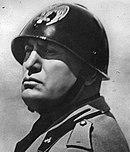Romano Mussolini
Romano Mussolini | |
|---|---|
 Romano Mussolini in 1932 | |
| Born | Romano Bruno Mussolini 26 September 1927 Forlì, Italy |
| Died | 3 February 2006 (aged 78) Rome, Italy |
| Occupations |
|
| Years active | 1945–2006 |
| Spouses | |
| Children | 3, including Alessandra and Rachele |
| Parent(s) | Benito Mussolini Rachele Guidi |
| Relatives | Sophia Loren (sister-in-law) Romano Floriani Mussolini (grandson) |
Romano Bruno Mussolini (26 September 1927 – 3 February 2006) was an Italian jazz pianist, painter, and film producer.[1] He was the fourth child and youngest son of Benito Mussolini.
Early life and education
[edit]Romano Mussolini grew up in Villa Carpena, his family's residence in Forlì in Romagna.[2] He studied music as a child, playing classical pieces on the piano and accompanying his father, Benito Mussolini, who played[3] the violin. After World War II, he started playing jazz under the assumed name "Romano Full".[4]
Musical career
[edit]His playing style has been described as "like a slightly melancholic Oscar Peterson. Occasionally inspired, he was always efficient; he made the refrains run on time."[5]
Personal life
[edit]In 1962, Mussolini married Maria Scicolone, the younger sister of actress Sophia Loren. They had two daughters, Alessandra and her younger sister Elisabetta. Alessandra led a small Italian far-right party often described as neofascist, Alternativa Sociale. Romano Mussolini composed the party's official anthem, "The Pride of Being Italian".[5]
With his second wife, the actress Carla Maria Puccini, he had a daughter, Rachele Mussolini, named after his mother Rachele Guidi. The younger Rachele has served as a member of the city council of Rome.[6]
Mussolini was very reserved about his family history until the entry of the post-fascist National Alliance party into government following the 2001 general election.[7] In 2004 he published a broadly sympathetic account of his personal recollections of his father, Il Duce, mio padre (translated as My father, il Duce: a memoir by Mussolini's son, alluding to the Fascist dictator's official title), including anecdotes of private confidences and discussions.[7]
Death
[edit]Romano Mussolini died from heart problems in a hospital in Rome in 2006, aged 78.
Selected discography
[edit]- Mirage (1974)
- Soft & Swing (1996)
- The Wonderful World of Louis (2001)
- Timeless Blues (2002)
- Music Blues (2002)
- Romano Piano & Forte (2002)
- Jazz Album (2003)
- Napule 'nu quarto 'e luna (2003)
- Alibi perfetto (2004) – soundtrack
Books
[edit]- Mussolini, Romano (2006) [2004]. My father il Duce: a memoir by Mussolini's son. Translated by Stojanovic, Ana. Introductory essay by Alexander Stille. San Diego, CA: Kales Press. ISBN 0-9670076-8-2.
References
[edit]- ^ "Same name, different fame". The Sydney Morning Herald. March 18, 2006.
- ^ Frasca, Simona; Vizzaccaro, Federico (2012). "Mussolini, Romano". Dizionario Biografico degli Italiani (in Italian). Vol. 77. Treccani. Archived from the original on 25 March 2024.
- ^ Chornik, Katia (29 July 2002). "El violìn de Mussolini". BBC Mundo (in Spanish). BBC. Archived from the original on 17 March 2024.
- ^ Mazzoletti, Adriano (2001). "Romano Mussolini". In Sadie, Stanley; Tyrrell, John (eds.). The New Grove Dictionary of Music and Musicians (2nd ed.). London: Macmillan Publishers. ISBN 978-1-56159-239-5.
- ^ a b Steyn, Mark (May 2006). "He made the refrains run on time". The Atlantic Monthly.
- ^ "Rachele Mussolini: Fascist dictator's granddaughter wins most votes in Rome's municipal elections". Euronews. 6 October 2021. Retrieved 6 October 2021.
- ^ a b Mussolini, Romano (2006). "Introductory essay by Alexander Stille". My father il Duce: a memoir by Mussolini's son. San Diego, CA: Kales Press. ISBN 0-9670076-8-2.
Writing the introductory essay to My Father Il Duce is a bit like writing the warning label on a powerful drug that has its uses but must be taken with care and knowledge of its potential side effects. The greatest benefit, perhaps, is understanding the evasions and self-deceptions of a certain kind of revisionist history and the conscious and unconscious manipulation of memory in learning to accept the unacceptable.
External links
[edit]- 1927 births
- 2006 deaths
- People from Forlì
- 20th-century Italian painters
- Italian male painters
- 21st-century Italian painters
- Children of prime ministers of Italy
- Italian jazz pianists
- Mussolini family
- 20th-century Italian pianists
- 20th-century Italian male musicians
- 20th-century Italian male artists
- 21st-century Italian male artists
- Italian male jazz pianists

